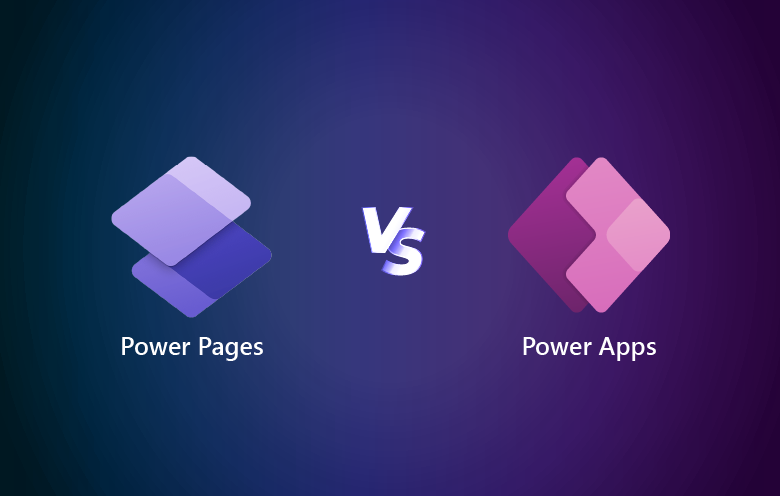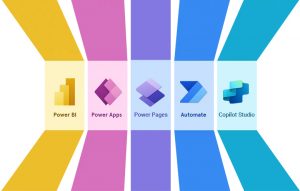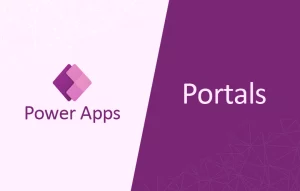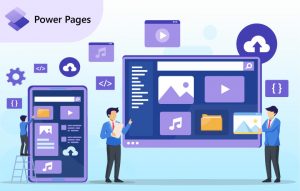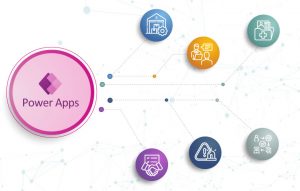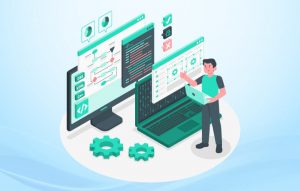Custom applications and websites are essential to meet both internal and external demands. However, building these solutions often requires significant development resources, time, and technical expertise.
Microsoft’s Power Platform offers businesses tools to create tailored solutions through low-code, no-code development. Among these tools, Power Apps and Power Pages enable organizations to build applications and websites with minimal development efforts. While both tools simplify digital development, they serve distinct purposes.
This blog explores the key differences between Power Pages and Power Apps and discusses respective use cases.
Power Pages vs Power Apps: Key differences
Power Apps is a low-code/no-code app development platform. It is used for custom business applications, primarily for internal employee-facing use cases. The tool enables non-developers to build apps for automating workflows, capturing data, and optimizing daily operations without extensive coding knowledge.
Power Pages was introduced as an evolution of the Power Apps Portals. It is a solution for building secure, external-facing websites. It allows organizations to create portals for customers, partners, and vendors. The tool ensures secure access to information and personalized experiences without needing an in-depth coding background.
Microsoft Power Pages: Capabilities, use cases, and benefits
Want to understand what Power Pages is and what are its key capabilities? Read our comprehensive blog to learn more about business benefits of Power Pages.
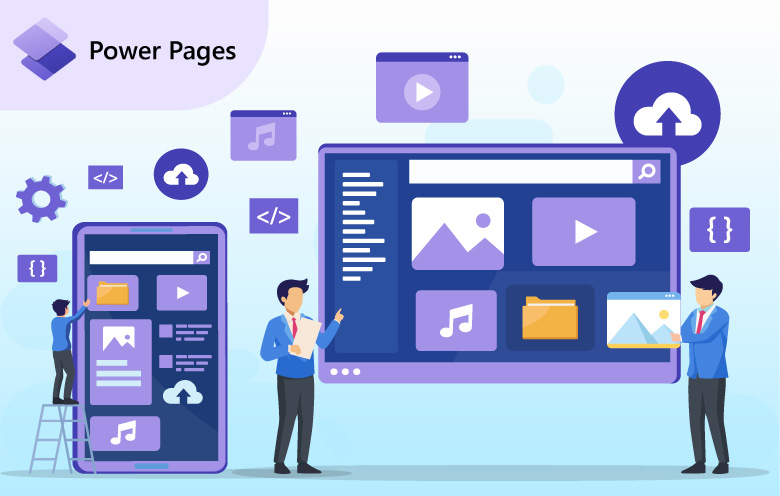
Though Power Apps and Power Pages both leverage Microsoft’s Power Platform, they have significant differences in capabilities and application areas.
| Feature | Power Apps | Power Pages |
|---|---|---|
| Primary purpose | Develops internal applications for organizations. | Creates secure, external-facing websites. |
| Target audience | Employees, internal users. | Customers, partners, external stakeholders |
| Use cases | Task management, data entry, approvals | Customer portals, registration sites, forms |
| Security and permissions | Azure AD integration for internal use | Enhanced security with Azure AD B2C support |
| Design flexibility | Predefined UI templates, mobile and desktop | Flexible web templates, responsive design |
Practical applications of Power Apps and Power Pages
Creating solutions within the Power Platform is as much about choosing the right tool as it is about understanding each tool’s best-fit scenarios:
Power Apps use cases:
-
Internal task management:
Streamlines daily tasks, helping employees manage workflows, track tasks, and update data.
-
Approval and review applications:
Enables quick internal approvals, reviews, and other workflows directly through the app.
-
Data collection and entry:
Gathers and updates information on the go, suitable for field agents or data collection scenarios.
Suggested: Top 9 Microsoft Power Apps use cases
Power Pages use cases:
-
Customer portals:
Provides secure login portals where customers can access their account details, order history, and other personalized information.
-
Event registration sites:
Helps organizations create websites for events, allowing attendees to register and access event details.
-
Partner and vendor portals:
Facilitates secure data exchange and communication with external partners, vendors, or collaborators.
Pricing and licensing
Microsoft provides flexible licensing options for both Power Apps and Power Pages, allowing organizations to scale their use of each tool based on needs.
Power Apps licensing
Power Apps offers two main pricing models:
- Per-app plan: Licenses individual apps for specific users, ideal for organizations that need limited applications for designated tasks or projects.
- Per-user plan: Provides unlimited apps for each licensed user, allowing for broad application across the organization without per-app limits.
This pricing flexibility helps organizations start small and scale as demand grows.
Power Pages licensing
Power Pages has a unique pricing model that considers both – the number of authenticated users (those logging in) and anonymous page views (where no login is required). This pricing structure is beneficial for customer or partner portals with varied user volumes and types.
-
Authenticated user pricing:
Charged based on the number of users with login access.
-
Anonymous page view pricing:
Charged based on page views, ideal for public information sites or portals without strict login requirements.
Power Pages licensing is structured to support scalability for websites with high external engagement, providing options to fit various levels of interaction and complexity.
Best fit scenarios for Power Apps and Power Pages
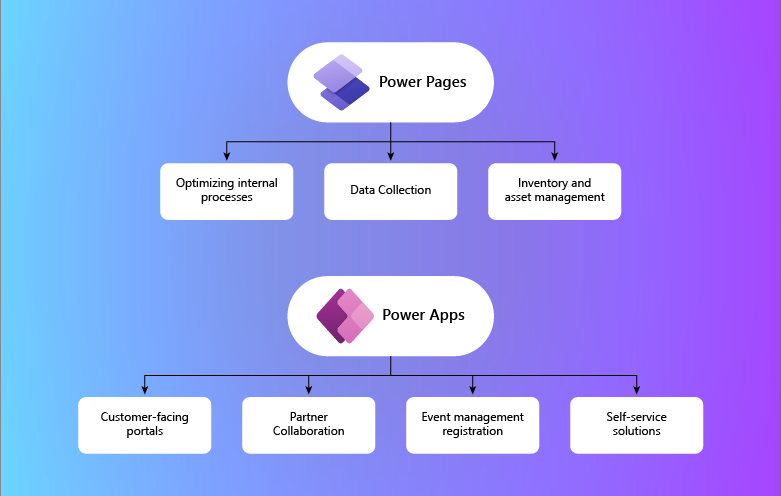
When to use Power Apps
- Optimizing internal processes: For internal workflows, task management, or routine approvals. Power Apps provides a powerful solution to automate and manage these processes efficiently.
- Data collection on the go: For field teams needing quick data entry or updates, such as site inspections or surveys. Power Apps offers mobile-friendly applications to collect and upload data seamlessly.
- Managing inventory and assets: Inventory management applications can help keep track of assets within an organization, offering real-time visibility and control to administrators.
Drive success with Power Apps solutions to transform tracking and management
Softweb Solutions developed a Power Apps application for a leading supplier of construction materials. With the app, the company can improve efficiency, minimize downtime, and streamline fleet management.
![]()
When to use Power Pages
- Customer-facing portals: Ideal for customer service portals or membership sites where users can securely log in to view personalized information, submit requests, or update account details.
- Partner collaboration: Partner or vendor portals provide a controlled access point for external partners to collaborate on specific projects, share documents, or access limited data.
- Event management and registration: Power Pages provides an interactive site where attendees can register, browse schedules, and receive updates.
- Self-service solutions: Power Pages can host self-service portals where users can troubleshoot issues, access FAQ sections, or explore product documentation, reducing the demand on support teams.
Real-life uses of Power Apps and Power Pages
Choice Aviation
A US-based international airline cargo company utilized Power Apps, Power Automate, and Power BI. Choice Aviation replaced manual, paper-based processes with automated workflows. It streamlined cargo tracking and improved communication. The app enabled staff to input data directly into digital forms. This eliminated paperwork, enhanced data accuracy, and allowed real-time tracking and updates.
- Improved freight processing times by over 80%.
G&J Pepsi
G&J Pepsi-Cola Bottlers streamlined its operations using Microsoft Power Platform. The company significantly reduced manual tasks across distribution, finance, and HR. They implemented Power Apps, Power Automate, and Power BI. The company gained real-time data access, automated workflows, and improved reporting. This transformation allowed employees to focus on higher-value activities, optimizing efficiency and enhancing decision-making processes across departments.
- Store Audit app with Power Apps saved the company an estimated $100,000 in outside development costs.
- Instantly cut data overages by at least $5,000 a month.
Call2Recycle
Call2Recycle is a battery recycling nonprofit organization. By using Power Pages to create a self-service portal, Call2Recycle streamlined customer engagement. This enabled users to easily access recycling information, request battery recycling kits, and schedule pickups. The platform also allowed them to save:
- 10 hours per month on invoicing
- 8 hours on banking activities like vendor payment uploads
- 12 hours on processing vendor invoice approvals
Leverage low-code/no-code app development platforms for faster time-to-market
Microsoft’s Power Platform tools, Power Apps and Power Pages, empower organizations with solutions tailored to internal and external needs. By understanding their unique capabilities and use cases, organizations can select the right tool to optimize operations and enhance user interactions.
Power Apps is best suited for internal application needs, while Power Pages provides a user-friendly solution for external engagements. Power Apps drives efficiency within teams, while Power Pages delivers secure and engaging online experiences for customers, partners, and other external stakeholders.
Softweb Solutions is one of the leading Power Platform consulting companies. We can help you leverage Power Apps and Power Pages to enhance productivity and drive customer engagement. Our team of certified Microsoft consultants provide end-to-end support—from design and development to integration and deployment. Discuss your unique business case with our experts.


